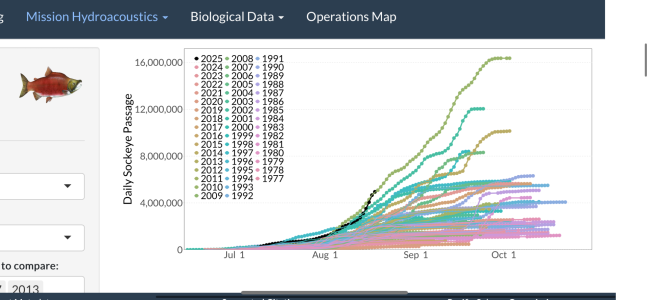ps://www.facebook.com/share/p/1Gj2CmjneL/
August 21st
, 2025
Statement re Resignation from the PSC Fraser Panel, from Michael Griswold:
A member of the Pacific Salmon Commission’s Fraser Panel for 40 years, I officially resigned
from my position August 19th. I did so for the following reason: I could no longer support the
Canadian government’s position on managing Fraser River sockeye.
It is my firm belief that the Canadian management plan was unnecessarily restrictive on this
year’s production of sockeye, which is now assessed at more than four times greater than the
pre-season forecast. It was clearly evident that this year’s run warranted Canadian commercial
harvest opportunities.
I further believe that the decision-making control of the panel was and is being usurped by a
less representative, inadequately equipped group. My assertion is that the directional control
of this group has led directly to DFO neglecting one of its key mandates: controlling and
managing sockeye spawning escapements.
I was, until my resignation, the longest sitting Canadian member of the panel, having been
appointed once the Pacific Salmon Treaty was implemented in 1985. The Canadian caucus of
the Fraser River Panel is essentially a round table encompassing all stakeholder interests,
including First Nations FSC and economic opportunity harvesters, commercial harvesters, and
recreational harvesters. I have studied and learned sockeye management in extensive detail in
my 40-year tenure at the panel. I was appointed both as a commercial industry stakeholder and
as a Canadian with the primary mandate to best represent all of Canada’s interests. I believe
that I have upheld that mandate as the Federal government has continually reappointed me to
the position since 1985.
In my history at the panel, I have witnessed a wide variance of sockeye production from the
Fraser River. I have come to understand how and why this production is affected. When stocks
are weak, harvest opportunities were necessarily constrained. When stocks were strong,
increased harvesting was permitted. Salmon management is dynamic. To effectively manage
salmon stocks, it is incumbent to be flexible in order to respond to the varying abundance. -This
has been the direction and operating procedure of the Fraser Panel from Day 1.
In 2025, this direction and procedure changed. We began the season with an estimate of a 2.5
million adult sockeye returning to the Fraser. We were presented with an escapement plan
crafted by a new body, the Fraser River Salmon Management Board, that laid out spawning targets for the various Fraser stocks. These targets on this forecast were the basis of the 2025
preseason management plan. Little known to the Panel, were the new rules added by this group
that eliminated the options that allowed for enhanced fisheries on increased abundance. In
particular, in the pre-season, there were concerns about the proposed restrictions for the late
run stock group. Because of the relatively small forecast, it was not initially expected that these
restrictions would unduly constrain fishing opportunities. However, when the Fraser sockeye
run returned at greater than 4 times its predicted forecast, currently 9.6 million fish, an
alteration to the pre-season plan was called for. Incredibly, the answer to that call has been ’no’.
In my past experience at the panel, such abundance resulted in commercial fishing
opportunities that were reflective of this realized abundance. These opportunities were crafted
to provide economic benefit and to manage escapement to the spawning grounds. However,
that is not the new guidance being imposed on the Fraser Panel. It is my belief that Fisheries
and Oceans Canada has abdicated its management mandate and has ceded that mandate to the
Fraser River Salmon Management Board, whose membership is narrowly limited.
DFO no longer manages to optimize production. In fact, its refusal to allow warranted harvests
could negatively affect potential production in some specific systems in the Fraser where
strategic population control is absolutely necessary to optimize production.
I resigned from the Fraser Panel because I could not support this new direction in management.
First, there was sufficient abundance of sockeye to warrant significant commercial
opportunities, and yet those opportunities have been denied. Second, there was a late run of
sockeye that was three times greater than forecast, warranting a measured relaxation of the
severe harvest restrictions. And third, I believed that the management mistakes that were made
in the past which adversely affected the production of the Fraser by overescapement, were
about to be made again. Lastly, I could no longer be party to and complicit in the panel process
whose decision-making power, I felt, was countermanded by the veto power newly granted to
the unrepresentative Fraser River Salmon Management Board.
When I warned DFO of these issues, my concerns were dismissed. As a result, I could not, in
good conscience, allow my name to be associated with this misguided, uninformed,
unbalanced, and under representative direction in Fraser River sockeye management.
Mike Griswold
Former Fraser Panel Member of the Pacific Salmon Commission


